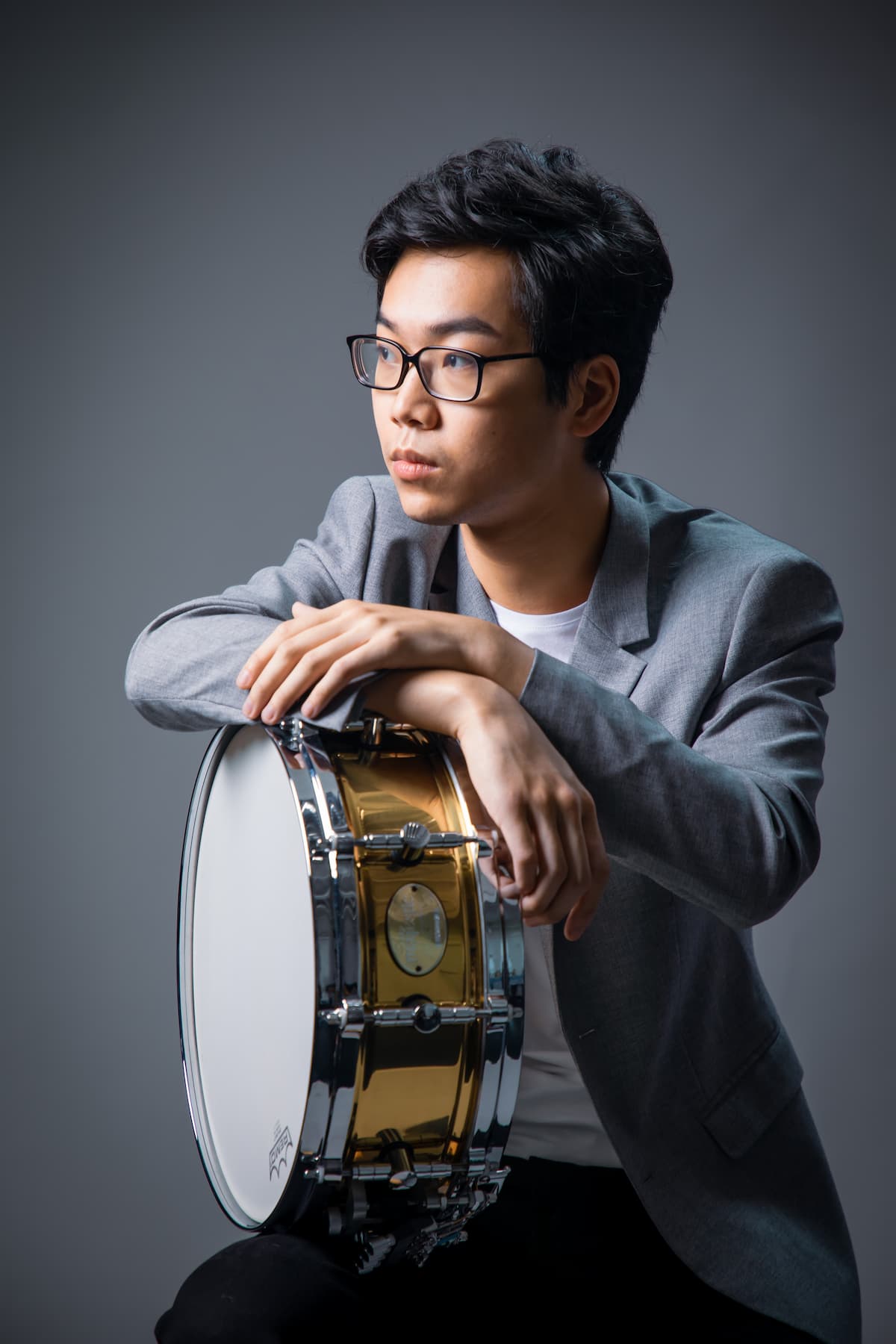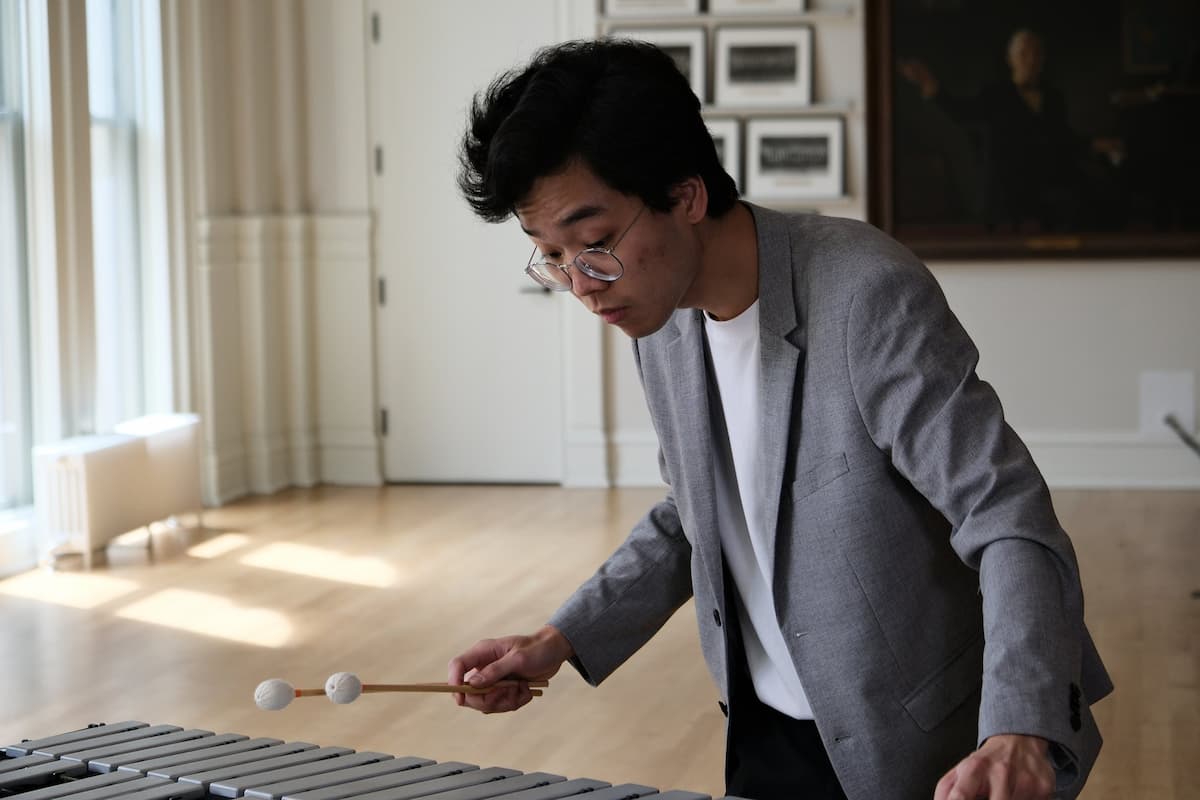‘A Little Spark That Can Turn One’s Life Completely Upside Down’

Michael Yeung
Hong Kong-born percussionist Michael Yeung is finishing up the prestigious Artist Diploma Program at Yale University, studying with renowned percussionist and educator Robert van Sice. Only the second-ever percussionist to be admitted to the course, where just one student is picked from an entire cohort to undertake, in Yale’s own words, the ‘highly selective program for exceptionally gifted instrumentalists and singers on the cusp of a major international solo career’, Michael is making a name as one of today’s most exciting young percussionists to watch.
Our cross-Atlantic chat takes place with Michael in a practice room, squeezing in some work before the semester begins, an array of instruments carefully tessellated together behind him as he works on James Wood’s Rogosanti for solo percussion. We talk about the early inspiration he found in a local percussion studio in Hong Kong, along with his experiences at Yale and the pedagogical threads that have run throughout his life thus far.
Asura, by Yao Chen
How did you feel when you found out the news that you were the second-ever percussionist to be admitted to Yale’s Artist Diploma?
It was like a jolt of adrenaline and disbelief and then this immense happiness. Professor Robert van Sice is a great pedagogue. I find him to be an incredibly deep thinker, and I’ve learned so much from him. The depth of his way of passing on knowledge to us is just marvellous.
Ever since I’ve been here, I find that the breadth of knowledge from others that is available to me on demand here at Yale is just incredible.
I am honoured to have this opportunity. It’s a rather interesting degree in that each year a singular student gets selected from all the instrumental students to be admitted to this programme, so the moment when I realised I could stay here for a fourth year, I felt immediately that I needed to grab this chance and run with it.
How has your experience been at Yale so far?
The percussion studio here has six graduate students, and it remains six people in perpetuity. It’s interesting in that it’s such a small studio – we are a very tight-knit group – and I would say that I learn just as much from my peers as I do from Professor van Sice, and also from the institution.
It’s really a special place to be. Of course, I’ve been here for four years, and I’m very biased! I don’t want it to sound like this is the only place for learning percussion in the world, but it is truly a special place. It’s definitely a family.
How did you find your way to percussion?
I grew up in Hong Kong – I spent 22 years there, and I’ve been here in the US for 4 years. In Asian countries, parents want their kids to indulge themselves in as many extracurricular activities as possible. For me, there was dance, drama, and music, of course.
I took piano lessons when I was five years old, and my piano instructor back then said to my mum, ‘I think he’s got potential – I think he has good rhythm,’ so my mum just took that and ran with it.
She signed me up to Dr Lung Heung Wing’s percussion centre, where there were weekly classes. Dr Lung was the principal percussionist of the Hong Kong Philharmonic, and I guess I just found myself in a really lucky position since childhood.
That percussion centre had so many djembes, bongos, maracas, cabasas – all these toys, these noise-making machines, on the shelves. And on the other side, there would be a snare drum, a marimba, a xylophone, so I got very very naturalised into the world of percussion playing from a very young age, which is due to my mum just taking one sentence and running with it, basically!
Do you envisage pedagogy being a large part of your career after you graduate from Yale?

© yeungchinglaam.com
Hong Kong Percussion Center was really invaluable to a whole generation of percussion students growing up in Hong Kong. That pedagogy and passing knowledge on is always something that I am fervent about.
I just find music to be such a joy and such a valuable part of my life that if I could just let one young person get to know one piece one iota better, then I would love to take that opportunity, always. It’s sometimes just a little spark that can turn one’s life completely upside down.
I think if I were just to talk about realistically living life as a musician, I think the stability of a college teaching job or a private teaching studio as a supplement to building repertoire, to building a portfolio of performance opportunities – I think that’s always just a smart thing to do.
But in addition to that, the idea of growing my art form, the percussive arts, and helping young kids and young adults learn to love music: I think that’s just a really fantastic joyous prospect to me. So, I do think absolutely teaching will be a big part of my life.
It is always a two-way street. I am fortunate to have a few teaching opportunities here at Yale. Some undergraduates take music lessons for credit, some do not, and some graduate students take secondary lessons in percussion. it’s always a two-way street; it’s always mutual growth.
When I go back to Hong Kong, I help out a few of my percussionist friends with their own private teaching studios, which are often oriented toward teaching primary school students. Of course, it’s also valuable to see how young people learn and then to see if you can pass on pedagogical knowledge to the kids, but to me, it’s just the simple joy of watching them learn to love music.
The breadth of percussion instruments and techniques is so wide and varied – do you have a specialisation, or preference for what to play?
I specialise in solo percussion, and solo percussion playing is a really new art form. Behind me at the moment is a rather gigantic setup, where you just amalgamate a lot of percussion instruments together to form a cohesive multiple-percussion singular instrument.
Of course, I love marimba and vibraphone as well, but as a solo percussionist, I play all sorts of percussion pieces. We are definitely the mad scientists in the room!
And do you have a favourite style, genre, or composer?
For keyboard percussion instruments, marimba, vibraphone, xylophone and so on, it would be transcriptions of Ravel. A lot of marimba music is transcribed from the piano literature – it could be the Bach keyboard partitas or Debussy (his Children’s Corner suite is played often).
When I was in my first year of undergrad, I transcribed the Prelude from Ravel’s Le Tombeau de Couperin onto the marimba as a solo, and it was really challenging. I’m not the first one to do this, but I’ve been doing a few other Ravel attempts on the marimba – for instance, me and another percussionist who graduated here last year, Yukiko Nakamura, have a video up on YouTube of us performing Le Tombeau de Couperin for two percussionists. It is a gorgeous piece.
Le Tombeau de Couperin, by Maurice Ravel
What do you do in your spare time?
I play a lot of video games away from music. These few years I’ve been really attached to Genshin Impact, which is a mobile game. I’m not an avid console or PC gamer, I really just stick to one or two games and just keep at it.
I think having a work/life balance is crucial to every living adult in the whole world, and to me, that is losing myself in a fantasy world. Aside from that, I doomscroll social media, of course. I also watch a lot of YouTube – perhaps an unhealthy amount!
———
As part of the Artist Diploma Program, Michael appears as a soloist with the Yale Philharmonia on 23rd February, performing Richard Rodney Bennett’s Marimba Concerto. Tickets and livestream details can be found here.
For more of the best in classical music, sign up for our E-Newsletter




